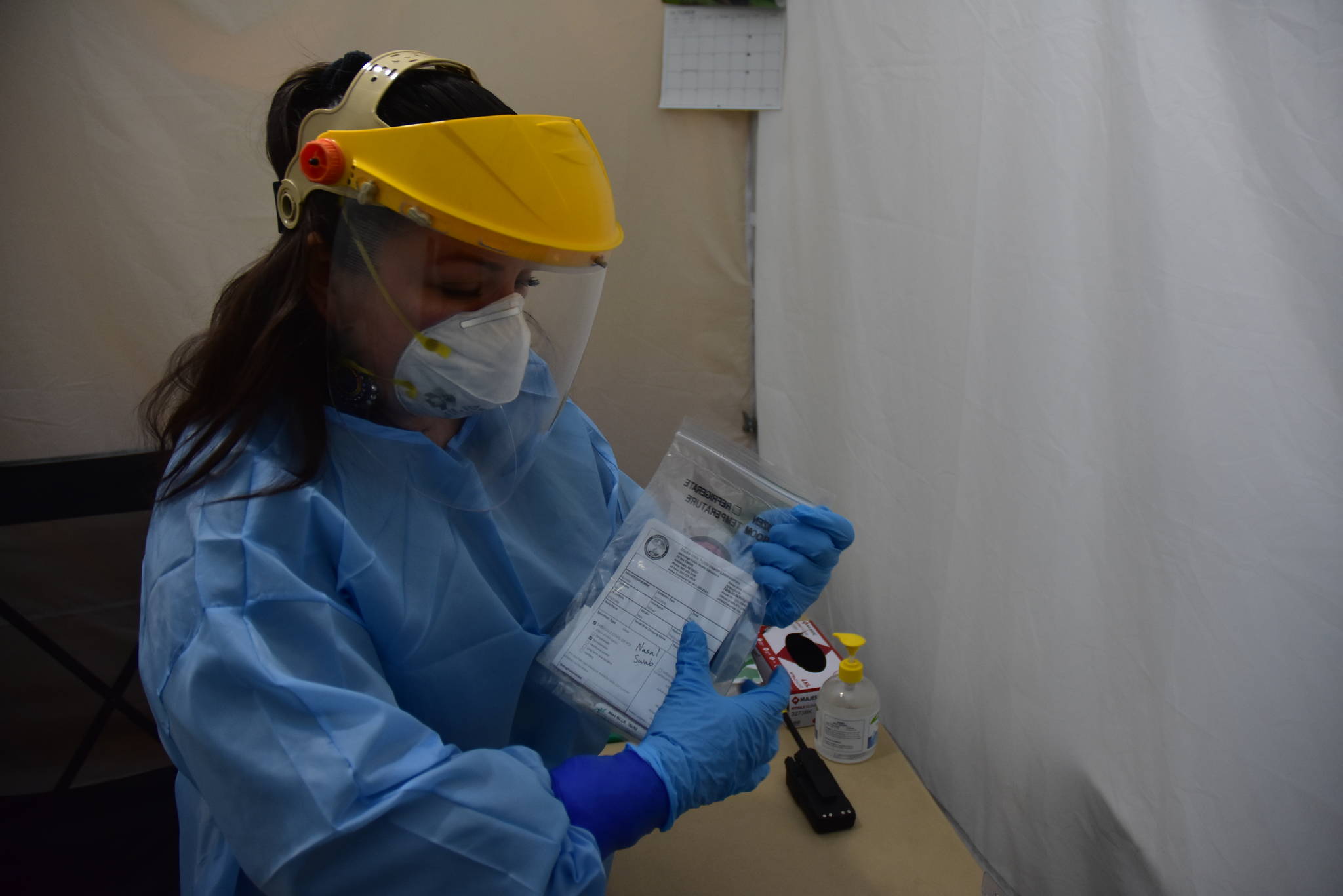Alaskan health officials urged stronger action from state and local governments on public health measures to help reverse the rising number of COVID-19 cases in the state and in Juneau where city officials Tuesday raised the health alert level.
At a meeting of the House Health and Social Services Committee on Tuesday, doctors, epidemiologists and representatives for health workers voiced their concerns for the steadily increasing COVID-19 cases in the state, which they say could overwhelm Alaska’s health care capacity if left unchecked.
“A large part of the population has returned to 2019 in terms of socializing,” said Dr. Thomas Hennessy, epidemiologist with University of Alaska Anchorage. “The infection has found the most vulnerable.”
Hennessy said many of cases can be traced back to community spread from social gatherings, and that greater care should be taken to mitigate the spread of COVID-19.
[City moves to high alert, reports dozens of new cases]
Juneau officials are working to contain an outbreak among the city’s unsheltered population and recently stepped up emergency quarantine facilities at Centennial Hall. In a news release Tuesday, the City and Borough of Juneau said 62 cases have been linked to that cluster so far, and 40 are considered active. Juneau has a total of 70 active cases, the release said.
Currently health care capacity in Anchorage is able to manage the increase, he said, but that could easily be disrupted by many factors such as a surge in cases not just of COVID-19 but other diseases such as influenza that could overwhelm hospital capacity.
There are less restrictive measures the state and local governments can implement now to avoid more severe measures like business closures later, Hennessy told the committee. Public health measures like mask wearing, social distancing and washing hands needed to be promoted more, either by mandate or by increased public messaging.
“We’ve already shown that we can limit cases in Alaska,” Hennessy said. “Policy actions have made a difference, too.”
CBJ enacted a mask mandate for all public spaces and businesses in July, and Tuesday
Jared Kosin, President and CEO of the Alaska State Hospital and Nursing Home Association called for the extension of the emergency declaration issued by Gov. Mike Dunleavy in March that’s set to expire Nov. 15. The declaration, Kosin said, provides certain flexibilities that could go away. But even aside from the technical advantages the declaration may give, the rising number of cases indicate the state is still under emergency conditions.
Alaska’s coronavirus cases have been growing steadily according to state data. The state’s average daily case rate per 100,000 residents over a 14-day window is one of the key metrics health officials look at when assessing the risk of coronavirus spreading in the state and its subregions.
The state reported 215 new cases Tuesday. Daily cases counts have been in over 200 for several days in a row according to state data.
State data show the average number of cases rising steadily since last August. Anything above a daily case rate of 10 puts the state on high alert level, which the state has been in since Sept. 12, and Tuesday afternoon the statewide average was almost 25. The state’s alert levels don’t come with any built-in restrictions, only a set of recommendations and guidelines for businesses and individuals to follow.
Some regions of the state are doing better than others. Most new cases are in Anchorage and Fairbanks, but smaller and more remote areas have seen an increase in cases in the past few weeks as well. As of Tuesday only two of the state’s 11 behavioral health regions were in the low-risk category, both of them in Southeast but excluding Juneau. Of the rest, only the Southwest region is in the intermediate level, all other state regions, including Juneau, are in the high-risk category.
Rep. Tiffany Zulkosky, D-Bethel, who chairs the committee said she had invited Department of Health and Social Services leadership including Commissioner Adam Crum and Chief Medical Officer Dr. Anne Zink, but they had declined despite the committee’s efforts to accommodate their schedule. Crum and Division of Elections Director Gail Fenumiai held a news conference on the state’s Vote Safe 907 plan at the same time as the committee hearing.
“I know we’re tired of it, you hear about COVID fatigue,” Kosin told the committee. “If we don’t make progress on this front, we could overwhelm Alaska’s health care capacity.”
Mitigation measures
City and Borough of Juneau Emergency Operations Center raised the city’s risk level to high on Tuesday. With the increased risk level come a series of mitigation measures meant to curb the spread of COVID-19.
The measures, which are effective as of Wednesday, Oct. 21, include:
• Bars and restaurants may not operate above 50% capacity, must have a 6 foot space for all patrons, and must close at 11 p.m.
• Personal services must go by appointment anyway, with no waiting areas.
• Gyms are limited to 25% capacity, with no group from activities.
•Masks must still be worn when in public, indoor locations.
• Indoor gatherings are limited to 20 people with masks required, and social bubbles should be only family members.

